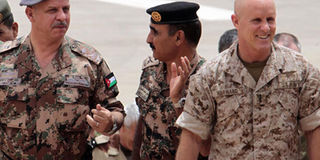US President loses pick for top security adviser

Jordan's Prince Faisal (left), army head of operations and training Maj-Gen Awni Adwan (centre) and deputy commander of US Central Command Robert S. Harward attend the "Eager Lion" joint military exercise at the King Abdullah Special Operations Training Centre in Amman on May 27, 2012. Ex-Admiral Harward has turned down the post of national security adviser. PHOTO | AFP
What you need to know:
- The president insisted neither he nor his campaign team had contacts with Russian officials in the run-up to last year's US election.
- Trump defended his political agenda and promised new executive orders regarding trade and immigration next week.
WASHINGTON
Donald Trump's reported pick for national security adviser turned down the job just hours after the president defended the ousted Michael Flynn, saying he "wasn't wrong" for dealing with Russia.
Retired Navy Admiral Robert Harward's rejection of the key post late Thursday leaves Trump without a replacement for Flynn, the first high-profile casualty of the US leader's tenure, and it added to a perception of disarray in his administration.
Harward told CNN he bowed out because of family and financial commitments, but several US media outlets reported that he was unhappy because he had no guarantees that the National Security Council — and not Trump's political advisers — would be in charge of policy.
Members of the council currently include Steve Bannon, Trump's controversial far-right former campaign manager.
One Harward friend told CNN that he didn't want the job because of chaos at the White House.
Flynn, a close adviser on Trump's 2016 campaign, resigned after it was revealed that he held telephone conversations during the election race with Russia's ambassador in Washington about US sanctions.
Flynn was no stranger to controversy.
His past included a paid appearance at a 2015 dinner sitting next to President Vladimir Putin and suggestions that Russia's seizure of Crimea and its support for Syrian leader Bashar al-Assad were acceptable.
Russia was the hot topic of a lengthy and often rambling press conference given by Trump on Thursday.
The president insisted neither he nor his campaign team had contacts with Russian officials in the run-up to last year's US election, contradicting an explosive report which he dismissed as "fake news".
Trump instead accused members of US intelligence agencies of breaking the law by leaking information about the calls.
PRISON TIME
Asked whether he or anyone on his staff had engaged in contacts with Russia prior to the election, Trump proclaimed: "No, nobody that I know of."
"I have nothing to do with Russia," Trump said. "The whole Russia thing is a ruse."
It was a full-throated denunciation of a bombshell New York Times report which said intercepted calls and phone records show Trump aides were in repeated contact with Russian intelligence officials well before the US election.
"It's all fake news," Trump insisted.
He stressed that the Times story centered instead on inappropriate action by US intelligence agencies, and he stepped up earlier attacks vowing to catch "low-life leakers" of potentially classified information that led to Flynn's ouster.
"Those are criminal leaks" by people angry about Democrat Hillary Clinton's loss, Trump told reporters.
"The people that gave out the information to the press should be ashamed of themselves."
The Washington Post meanwhile reported that Flynn denied to FBI agents that he had discussed US sanctions on Russia with Moscow's ambassador.
If Flynn did discuss the sanctions, as Trump appears to believe, then the retired general could be looking at prison time because lying to the FBI is a felony, though the president defended him.
"What he did wasn't wrong," Trump stressed.
"I didn't direct him" to discuss sanctions, Trump added.
"But I would have directed him because that's his job" to talk with foreign contacts.
LEADERS ALARMED
Trump defended his political agenda and promised new executive orders regarding trade and immigration next week.
But most of his remarks centered on Russia connections.
"I would love to be able to get along with Russia," Trump said.
"It would be much easier for me to be tough on Russia, but then we're not going to make a deal."
The revelations about the Trump campaign and Russia have alarmed even Republican leaders, wary of the president's overtures toward Moscow.
"It is a cloud over the White House," said Republican Senator Lindsey Graham, who has called for in-depth investigations.
Various news reports say Trump plans to name New York billionaire Stephen Feinberg — who has no national security experience — to lead a sweeping review of US intelligence agencies.
Amid mounting calls for more sweeping congressional investigations, one Democrat accused Trump's campaign of collusion with Moscow.
"I believe there was collusion," House Democrat Maxine Waters told CNN, stressing that Trump's focus on the leaks was a distraction.
Trump's view on leaks has flipped since the 2016 campaign when he proclaimed "I love WikiLeaks" — the organisation that published hacked Clinton campaign emails.
MILITARY COOPERATION
He also dismissed as a "joke" his suggestion that Russia was behind the damaging leaks.
By January, US intelligence had concluded that those leaks were part of a wider campaign ordered by Putin to try to tilt the election in Trump's favour. Moscow denies any involvement.
Meanwhile, the Trump administration has moved gingerly on Russia, sending top officials to Europe to reassure Nato allies while making its opening official contacts with the Russians.
Secretary of State Rex Tillerson met with Russian counterpart Sergei Lavrov in Bonn, and said Washington is prepared to work with Russia "when we can find practical areas of cooperation".
In Brussels, Defence Secretary James Mattis said the Pentagon was not ready "right now" for military cooperation with Moscow "but our political leaders will engage and try to find common ground".





